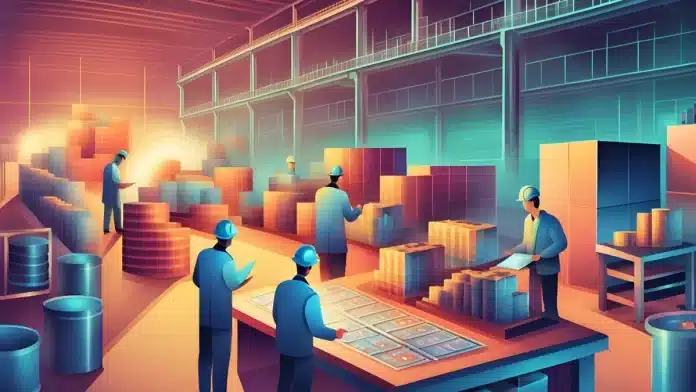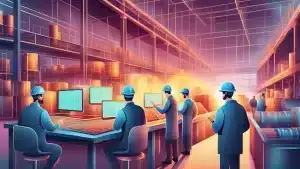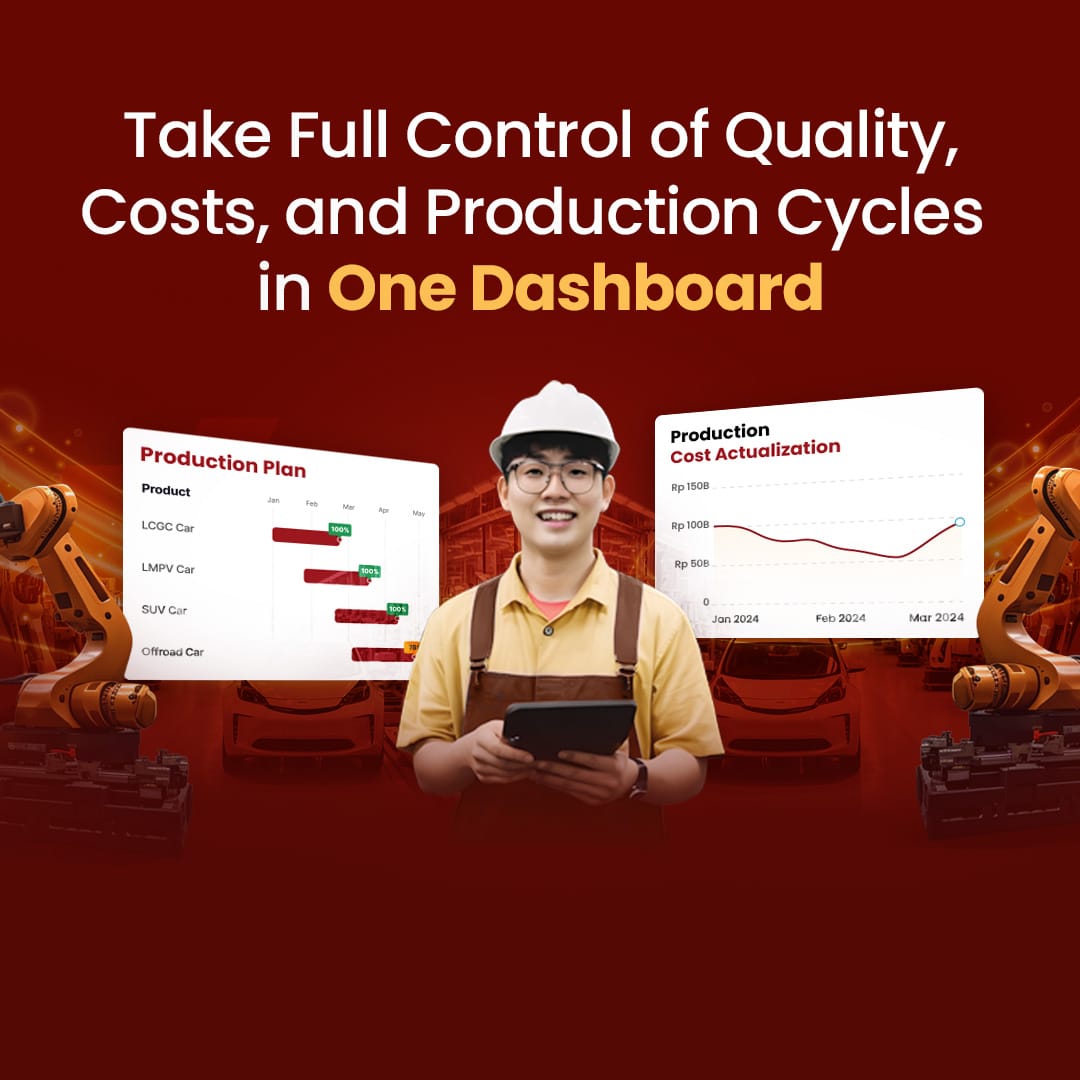In today’s competitive environment, optimizing resource management is vital for success. Manufacturing Resource Planning II (MRP II) is an advanced system that enhances and integrates production schedules, inventory, and procurement, ensuring maximum resource efficiency.
MRP II provides a comprehensive solution to complex manufacturing challenges by coordinating processes, improving forecast accuracy, and minimizing waste. For companies facing inefficiencies and rising costs, MRP II offers a strategic advantage with a unified approach to resource management.
With many MRP solutions available, selecting the right system for your needs is crucial. Data from EDB Singapore shows that businesses using MRP systems have achieved up to a 25% improvement in operational efficiency.
In this article, we will explore the fundamentals of MRP II, discuss its impact on company productivity, and guide you through the selection process for the most suitable MRP system.
Key Takeaways
|
Table of Content:
Table of Content
What is Material Requirement Planning I (MRP I)?
Material Requirements Planning (MRP I) is essential in manufacturing and supply chain management, aimed at optimizing production planning and scheduling. MRP I calculates the precise quantity and timing of materials needed based on demand forecasts and production schedules.
It integrates data from the bill of materials (BOM), inventory levels, and master production schedules to ensure the timely availability of raw materials and components.
MRP I’s main goal is to improve operational efficiency by reducing excess inventory, lowering carrying costs, and avoiding stockouts that can disrupt production.
By streamlining inventory management and procurement, MRP aligns manufacturing activities with customer demand, enhancing overall operational effectiveness and market responsiveness.
What is Manufacturing Resource Planning II (MRP II)?
Manufacturing Resource Planning (MRP II) is an advanced system designed to help manufacturers effectively plan and manage the resources required for their production processes. MRP II extends the capabilities of Material Requirements Planning (MRP), which primarily focuses on ensuring the availability of raw materials.
The goal of MRP II is to integrate various aspects of manufacturing, including operational and financial planning, as well as contingency planning, to provide alternative solutions when issues arise.
Unlike proprietary software, MRP II can be implemented using various software solutions, allowing manufacturers to choose the best fit for their needs.
Many manufacturers use comprehensive project management software to manage production scheduling, resource planning, tracking, and reporting.
For example, Project manager is an online tool that helps manufacturing teams organize their work, track progress visually using kanban boards, and centralise tasks. Consider trying Project manager for free today to see how it can enhance your manufacturing resource planning.
Differences Between MRP I and MRP II
The main difference between these two types of manufacturing information management systems is that Manufacturing Resource Planning (MRP II) includes all the features from a Material Requirements Planning (MRP I) system described above, as well as other tools.
MRP II takes master production scheduling, bill of materials, and inventory control functionality from MRP I and provides additional features such as demand forecasting, accounting, QC report, and production capacity planning.
These enhancements make MRP II a more comprehensive solution, offering deeper integration and more extensive capabilities for managing manufacturing processes.
|
Feature |
MRP I |
MRP II |
| Primary Focus | Material planning and inventory control | Comprehensive resource planning |
| Master Production Scheduling | Yes | Yes |
| Bill of Materials (BOM) | Yes | Yes |
| Inventory Control | Yes | Yes |
| Demand Forecasting | No | Yes |
| Accounting Integration | No | Yes |
| Quality Control | No | Yes |
| Production Capacity Planning | No | Yes |
| Operational Planning | Limited | Extensive |
| Financial Planning | No | Yes |
| Contingency Planning | No | Yes |
| Software Flexibility | Limited | High, integrate multiple software solutions |
MRP II builds on the foundation laid by MRP I, incorporating more sophisticated tools and broader functionality to address the complex needs of modern manufacturing operations.
This expansion makes MRP II an essential system for companies seeking to optimize their production processes and resource management comprehensively.
Why is MRP II Important for Companies?
Manufacturing Resource Planning (MRP II) software is essential for companies aiming to enhance their production efficiency and operational effectiveness.
MRP II builds upon the original Material Requirements Planning (MRP) by incorporating additional data, such as machine and labour capacities, leading to more accurate and comprehensive planning.
A study by the Singapore Economic Development Board (EDB) highlights that companies in Singapore utilizing MRP II have experienced significant improvements in production scheduling, inventory control, and overall productivity.
This is particularly crucial in Singapore’s competitive manufacturing sector, where effective resource management is key to maintaining a competitive advantage.
Implementing MRP II enables companies to optimize material procurement, minimize delays, and better allocate resources, ultimately resulting in cost savings and increased profitability.
Stages in MRP Systems for Improved Company Efficiency
To ensure a seamless integration of MRP software into your company’s operations, it is crucial to understand the specific steps involved in this advanced planning system. These steps provide a structured approach to optimizing resources, improving efficiency, and enhancing overall productivity.
1. Identify the quantity requirements
One of the pivotal steps in the manufacturing resource planning software II process involves accurately identifying the quantity requirements for production and inventory. This step requires a thorough analysis of both current inventory levels and future demand forecasts.
By meticulously assessing the amount of raw materials, components, and finished goods needed, companies can ensure that they have the appropriate quantities available to meet production schedules without overstocking or understocking.
This process not only aids in maintaining efficient inventory levels but also helps in aligning production capabilities with anticipated market needs, ultimately contributing to streamlined operations and optimized resource utilization.
2. Perform MRP II calculations
Once you accurately identify your quantity requirements, the next critical step is performing the MRP II calculations. This process involves evaluating the status of items within the inventory system, including those currently in stock, in transit, or on order.
Additionally, it requires assessing the status of materials deemed essential, delayed, or expedited. To compute MRP II, you will need to apply specific formulas that involve multiplying marginal revenue by the marginal physical product of the resource.
This calculation helps determine the optimal quantity of resources required to meet production schedules while balancing costs and resource availability.
By performing these calculations, you ensure that the production plan is both feasible and aligned with the company’s strategic objectives, ultimately contributing to enhanced operational efficiency.
3. Complete orders
After completing the manufacturing resource planning system II calculations for your company, you can utilize the results to determine the appropriate orders to place.
These calculations provide a comprehensive overview of your company’s recommended purchasing schedule, which is essential for meeting production demands.
This includes generating detailed work orders, primary and secondary reports, and a material plan that outlines the inventory requirements needed to support production.
By carefully following the prescribed schedule and making any necessary adjustments based on real-time data and changing conditions, your company maintains an optimal balance between demand and supply, enhancing overall operational efficiency and effectiveness.
Material Requirements Planning (MRP I) and Manufacturing Resource Planning (MRP II) represent distinct phases in the evolution of production planning systems, each offering unique capabilities and benefits.
MRP I primarily focuses on the planning and scheduling of raw materials and inventory necessary for production, relying on data related to inventory levels, lead times, and production schedules to ensure the timely availability of materials.
In contrast, MRP II extends beyond the scope of MRP I by integrating additional functions such as capacity planning, labor management, and financial forecasting.
This holistic approach enables MRP II to provide a comprehensive framework for managing not only inventory but also the broader range of resources involved in production, including human resources and machinery.
Conclusion
Manufacturing Resource Planning (MRP II) is an advanced system designed to optimize production processes by integrating inventory management, capacity planning, and financial forecasting into a cohesive framework.
In today’s competitive business environment, particularly in Singapore, adopting MRP II has become crucial for companies seeking to enhance operational efficiency and productivity. By implementing MRP II, businesses can streamline their production workflows, reduce costs, and improve resource utilization.
HashMicro offers robust MRP II solutions tailored to address the specific challenges faced by companies, providing an integrated approach to resource management.
To explore how HashMicro’s solutions can transform your company’s operations, we invite you to experience a free demo. This demonstration will showcase how our MRP software can effectively resolve your business challenges and drive significant improvements in performance.

Questions About Manufacturing Resource Planning
-
What is the difference between MRP and MRP II?
MRP II gives companies much greater control over their scheduling, forecasting, budgeting and production processes. Direct contrasts between MRP and MRP II include the following: Resources. MRP lists only materials requirements, while MRP II lists all needed resources, including equipment and workforce.
-
Is MRP part of ERP?
An ERP refers to multiple different business software that automates several processes such as sales, finance and HR management. An MRP is one specific module of an ERP. A business’s ERP can include an MRP, but it does not have to if manufacturing resource planning is not relevant to the company.
-
What is the concept of MRP II?
Manufacturing resource planning is abbreviated “MRP II” (or “MRP 2”) to distinguish it from material requirements planning (MRP I). Manufacturing resource planning 2 encompasses all the capabilities of MRP I, which focuses on a manufacturer’s inventory of raw materials and supplied components.























































